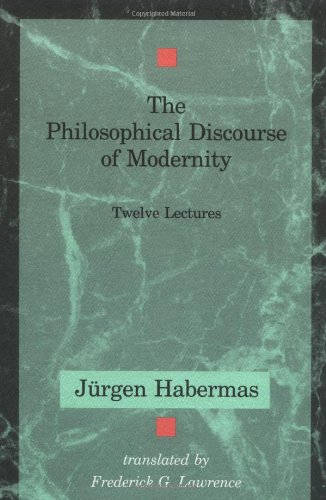The Philosophical Discourse of Modernity book
Par edwards christian le samedi, juin 18 2016, 09:26 - Lien permanent
The Philosophical Discourse of Modernity. Frederick Lawrence, Jurgen Habermas, Thomas McCarthy

The.Philosophical.Discourse.of.Modernity.pdf
ISBN: 0745608303,9780745608303 | 456 pages | 12 Mb

The Philosophical Discourse of Modernity Frederick Lawrence, Jurgen Habermas, Thomas McCarthy
Publisher: Polity Press
The Philosophical Discourse of Modernity: Twelve Lectures. For short accounts relevant for the present purpose, see Habermas, Jurgen, The Philosophical Discourse of Modernity, translated by Frederick G. This perspective is precisely part of a discourse of modernity that is established in the 19th century in the wake of the Industrial Revolution and becomes dominant in the USA after the Scopes trial in the 1920s. It gave me better ways of thinking about modernity and much else besides. Thus, Habermas's project is rooted in modernity and Enlightenment with claims of universalization of action norms (discourse ethics) to institutionalize democratic deliberative polity based on the rule of law. Jürgen Habermas, 'The Philosophical Discourse of Modernity' (1985). Jon Cogburn said in reply to bzfgt I'm sorry bzfgt. Cambridge: The MIT Press, 1996. Aletheia [unconcealedness; truth] could be the word that offers a hitherto unnoticed hint concerning the essence of esse [to be]. No one else in the meeting had heard of Habermas. "William Blake Rejects the Enlightenment." Critical Essays on William Blake. The Philosophical Discourse of Modernity by Jürgen Habermas. Theodor Ludwig Wiesengrund Adorno (September 11, 1903 – August 6, 1969) was a German philosopher who wrote widely in the areas of sociology, social psychology, aesthetics, musicology, and literary criticism. The book is The Philosophical Discourse of Modernity . The Philosophical Discourse of Modernity, 1987. Sign up for LibraryThing to find out whether you'll like this book. Moral Consciousness and Communicative Action, 1990. Scientific reasoning does not sit easily with the presuppositions of any religion, and the work of Enlightenment philosophers made the belief in God appear irrational…It is easy to imagine Mohammed Atta, at Hamburg . Which has been predominant in the philosophical discourse on virtue.